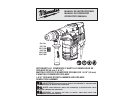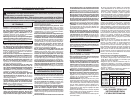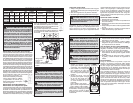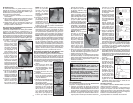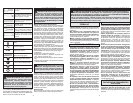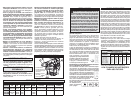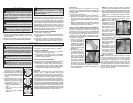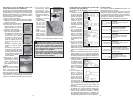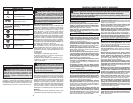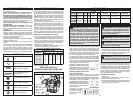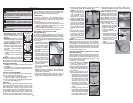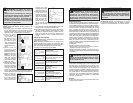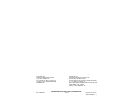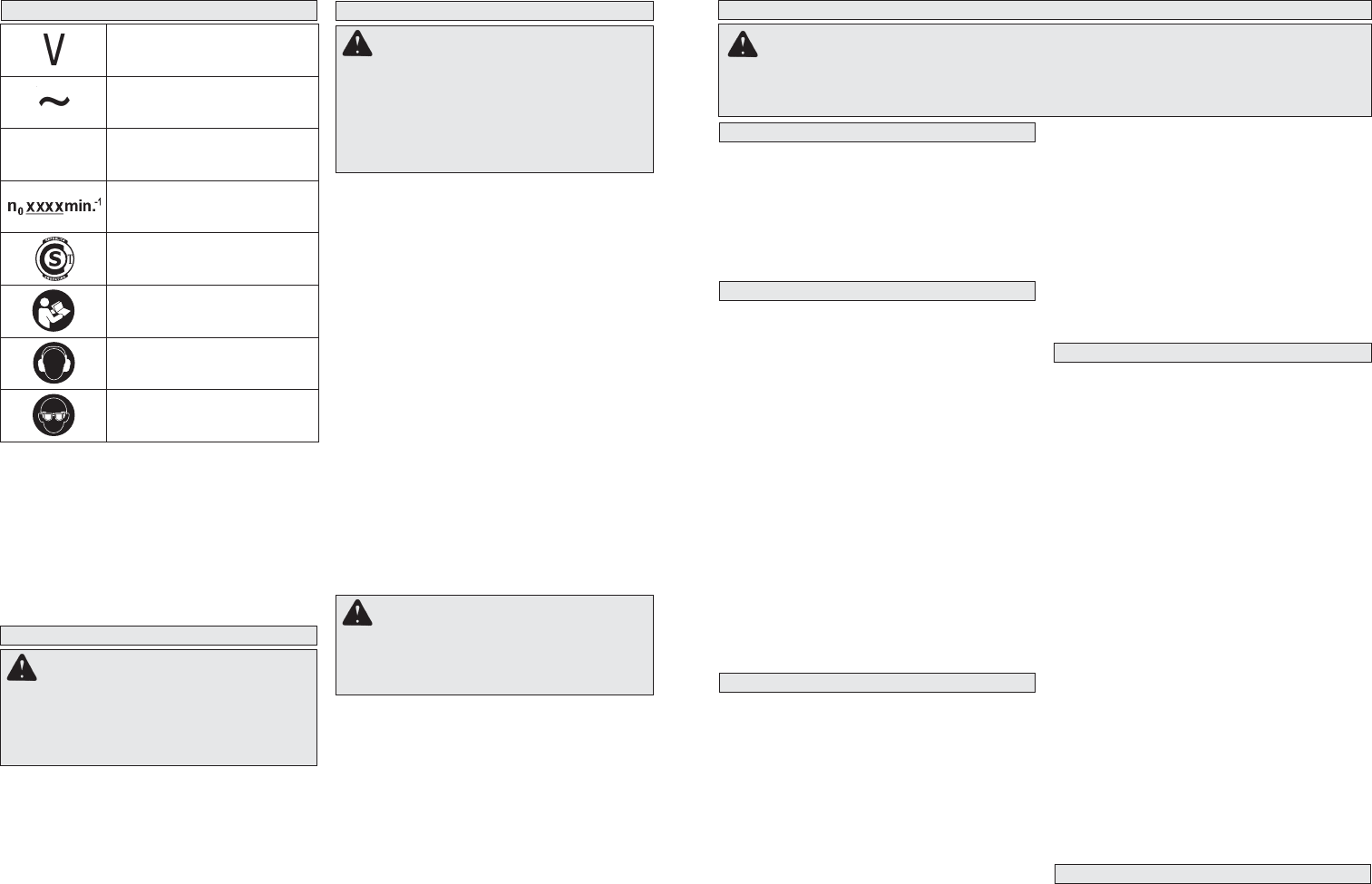
16
17
ACESSÓRIOS
Para obter uma listagem completa de acessórios,
consulte o catálogo de ferramentas elétricas da
MILWAUKEE ou visite www.milwaukeetool.com.
Para obter o catálogo, entre em contato com o seu
distribuidor local ou com um centro de serviços.
AVISO Para reduzir o risco de ferimen-
tos, sempre retire a ferramenta da tomada
antes de fi xar ou remover acessórios. Use
somente acessórios especifi camente reco-
mendados. Outros acessórios podem ser
perigosos.
Volts
Corrente alternada
IPM
Impactos por minuto
Rotações por Minuto (RPM)
sem carga
Selo da segurança elétrica
Leia o manual do operador
Proteção Auricular
Protetor Ocular
AVISO Para reduzir o risco de ferimen-
tos, choques elétricos e danos à ferramenta,
nunca mergulhe a ferramenta em líquido nem
permita que líquidos entrem em contato com
a parte interna da ferramenta.
Limpeza
Limpe poeira e resíduos nos orifícios de ventilação.
Mantenha as alças limpas e livres de óleo ou graxa.
Use somente sabão suave e um lenço de limpeza
umedecido para limpar a ferramenta, pois certos
agentes de limpeza e solventes causam danos aos
plásticos e a outras peças revestidas. Veja alguns
exemplos desses agentes: gasolina, terebentina,
solventes, solventes de tinta, solventes de limpeza
à base de cloro, amônia e detergentes domésti-
cos que contêm amônia. Nunca use solventes
infl amáveis ou combustíveis perto das ferramentas.
Reparos
Se a ferramenta estiver danifi cada, envie-a para
a assistência técnica autorizada mais próxima.
MANUTENÇÃO
AVISO Para reduzir o risco de ferimen-
tos, sempre retire a ferramenta da tomada
antes de realizar qualquer atividade de ma-
nutenção. Nunca desmonte a ferramenta
ou tente fazer qualquer ajuste na fi ação do
sistema elétrico da ferramenta. Entre em con-
tato com uma assistência técnica autorizada
da MILWAUKEE para QUALQUER reparo.
Manutenção das ferramentas
Mantenha a ferramenta em boas condições ado-
tando um programa de manutenção regular. Antes
de utilizar a ferramenta, examine as condições
gerais. Verifi que as proteções, os botões, o con-
junto de fi ação e o cabo extensor para verifi car
se há danos. Verifi que se há parafusos soltos,
desalinhamento, travamento de peças móveis,
montagem inadequada, peças quebradas e outros
problemas que possam afetar a operação segura.
Se houver ruído ou vibração anormal, desligue
imediatamente a ferramenta e corrija o problema.
Não utilize uma ferramenta danifi cada. Ferramen-
tas danifi cadas “NÃO DEVEM SER USADAS” até
que sejam reparadas (ver “Reparos”).
Sob condições normais, não é necessário lubri-
fi car novamente até que as escovas do motor
sejam substituídas. Após seis meses ou um ano,
dependendo do uso, envie a ferramenta para "a
assistência técnica autorizada Milwaukee mais
próxima para:
• Lubrifi cação
• Verifi cação e substituição das escovas
• Inspeção mecânica e limpeza (engrenagens,
eixos, mancais, caixa, etc.)
• Inspeção elétrica (botão, cabo, blindagem, etc.)
• Teste para assegurar a operação mecânica e
elétrica adequada
SIMBOLOGÍA
PERSONAL SAFETY
GENERAL POWER TOOL SAFETY WARNINGS
WORK AREA SAFETY
ELECTRICAL SAFETY
• Keep work area clean and well lit. Cluttered or
dark areas invite accidents.
• Do not operate power tools in explosive atmo-
spheres, such as in the presence of fl ammable
liquids, gases or dust. Power tools create sparks
which may ignite the dust or fumes.
• Keep children and bystanders away while
operating a power tool. Distractions can cause
you to lose control.
• Power tool plugs must match the outlet. Never
modify the plug in any way. Do not use any
adapter plugs with earthed (grounded) power
tools. Unmodifi ed plugs and matching outlets will
reduce risk of electric shock.
• Avoid body contact with earthed or grounded
surfaces such as pipes, radiators, ranges and
refrigerators. There is an increased risk of electric
shock if your body is earthed or grounded.
• Do not expose power tools to rain or wet condi-
tions. Water entering a power tool will increase
the risk of electric shock.
• Do not abuse the cord. Never use the cord for
carrying, pulling or unplugging the power tool.
Keep cord away from heat, oil, sharp edges
or moving parts. Damaged or entangled cords
increase the risk of electric shock.
• When operating a power tool outdoors, use an
extension cord suitable for outdoor use. Use
of a cord suitable for outdoor use reduces the risk
of electric shock.
• If operating a power tool in a damp location
is unavoidable, use a residual current device
(RCD) protected supply. Use of an RCD reduces
the risk of electric shock.
• Remove any adjusting key or wrench before
turning the power tool on. A wrench or a key left
attached to a rotating part of the power tool may
result in personal injury.
• Do not overreach. Keep proper footing and
balance at all times. This enables better control
of the power tool in unexpected situations.
• Dress properly. Do not wear loose clothing or
jewellery. Keep your hair, clothing and gloves
away from moving parts. Loose clothes, jewel-
lery or long hair can be caught in moving parts.
• If devices are provided for the connection of
dust extraction and collection facilities, ensure
these are connected and properly used. Use of
dust collection can reduce dust-related hazards.
WARNING READ ALL SAFETY WARNINGS AND ALL INSTRUCTIONS.
Failure to follow the warnings and instructions may result in electric shock, fi re and/or
serious injury. Save all warnings and instructions for future reference
The term "power tool" in the warnings refers to your mains-operated (corded) power tool or
battery-operated (cordless) power tool.
POWER TOOL USE AND CARE
• Do not force the power tool. Use the correct
power tool for your application. The correct
power tool will do the job better and safer at the
rate for which it was designed.
• Do not use the power tool if the switch does not
turn it on and off. Any power tool that cannot be
controlled with the switch is dangerous and must
be repaired.
• Disconnect the plug from the power source
and/or the battery pack from the power tool
before making any adjustments, changing
accessories, or storing power tools. Such
preventive safety measures reduce the risk of
starting the power tool accidentally.
• Store idle power tools out of the reach of chil-
dren and do not allow persons unfamiliar with
the power tool or these instructions to operate
the power tool. Power tools are dangerous in the
hands of untrained users.
• Maintain power tools. Check for misalignment
or binding of moving parts, breakage of parts
and any other condition that may affect the
power tool’s operation. If damaged, have the
power tool repaired before use. Many accidents
are caused by poorly maintained power tools.
• Keep cutting tools sharp and clean. Properly
maintained cutting tools with sharp cutting edges
are less likely to bind and are easier to control.
• Use the power tool, accessories and tool bits
etc., in accordance with these instructions,
taking into account the working conditions and
the work to be performed. Use of the power tool
for operations different from those intended could
result in a hazardous situation.
• Stay alert, watch what you are doing and use
common sense when operating a power tool. Do
not use a power tool while you are tired or under
the infl uence of drugs, alcohol or medication. A
moment of inattention while operating power tools
may result in serious personal injury.
• Use personal protective equipment. Always
wear eye protection. Protective equipment such
as dust mask, non-skid safety shoes, hard hat, or
hearing protection used for appropriate conditions
will reduce personal injuries.
• Prevent unintentional starting. Ensure the
switch is in the off-position before connecting
to power source and/or battery pack, picking
up or carrying the tool. Carrying power tools with
your fi nger on the switch or energising power tools
that have the switch on invites accidents.
SERVICE
• Have your power tool serviced by a qualifi ed
repair person using only identical replacement
parts. This will ensure that the safety of the power
tool is maintained.



